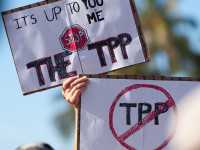Digital policies may not have played a significant role in the just-concluded national election, but the arrival of a majority Liberal government will leave many expecting “real change” on the digital front in the years ahead. My weekly technology law column (Toronto Star version, homepage version) notes that Prime Minister-designate Justin Trudeau is likely to focus on key economic promises from his platform once Parliament resumes. However, there will be several digital issues that should command attention during his first 12 months in office.

Telecom by yum9me (CC BY-NC-ND 2.0) https://flic.kr/p/53jSy4
Telecom
Canada Caves on Copyright in TPP: Commits to Longer Term, Urge ISPs to Block Content
The final Trans Pacific Partnership intellectual property chapter leaked this morning confirming what many had feared. While the Canadian government has focused on issues like dairy and the auto sector, it caved on key copyright issues in the agreement. As a result, works will be locked out of the public domain for decades at a cost to the public of hundreds of millions of dollars. Moreover, the government will “induce” Internet providers to engage in content blocking even where Canadian courts have not ruled on whether the content infringes copyright. As a result (and as expected – this was raised years ago), the government’s “made in Canada” approach to copyright – which it has frequently touted as representing a balanced approach – faces a U.S. demanded overhaul. In fact, even as other countries were able to negotiate phase-in periods on copyright changes, the Canadian negotiators simply caved.
The biggest change is a requirement to extend the term of copyright from life of the author plus 50 years to life plus 70 years. The additional 20 years will keep works out of the public domain for decades. The New Zealand government estimates that this change alone will cost NZ$55 million per year for a country that is one-ninth the size of Canada. Moreover, New Zealand was able to negotiate a delayed implementation of the copyright term provision, with a shorter extension for the first 8 years. It also obtained a clear provision that does not make the change retroactive – anything in the public domain stays there. Malaysia also obtained a delay in the copyright term extension requirement.
Why Canada’s Net Neutrality Enforcement is Going at Half-Throttle
Canada’s net neutrality rules, which require Internet providers to disclose how they manage their networks and to treat content in an equal manner, were established in 2009. The policy is administered by the Canadian Radio-television and Telecommunications Commission (CRTC), which releases quarterly reports on the number of complaints it receives and whether any have been escalated to enforcement actions.
At first glance, the reports on the so-called Internet traffic management guidelines suggest that net neutrality violations are very rare. My weekly technology law column (Toronto Star version, homepage version) notes that last year, there were typically a few complaints each month and all were quickly resolved. The CRTC does not disclose the specific targets or subject matter of the complaints.
Yet according to documents obtained under the Access to Information Act, the complaints and their resolution give cause for concern. There are generally two types of complaints: those involving throttling technologies that limit speeds to render real-time services unusable or treat similar content in different ways, and quality-of-service issues that seem like throttling to the customer.
The TPP Copyright Chapter Leaks: Canada May Face Website Blocking, New Criminal Provisions & Term Extension
KEI this morning released the May 2015 draft of the copyright provisions in the Trans Pacific Partnership (copyright, ISP annex, enforcement). The leak appears to be the same version that was covered by the EFF and other media outlets earlier this summer. As such, the concerns remain the same: anti-circumvention rules that extend beyond the WIPO Internet treaties, additional criminal rules, the extension of copyright term, increased border measures, mandatory statutory damages, and expanding ISP liability rules, including the prospect of website blocking for Canada.
Beyond the substantive concerns highlighted below, there are two key takeaways. First, the amount of disagreement within the chapter is striking. As of just a few months ago, there were still many critical unresolved issues with widespread opposition to (predominantly) U.S. proposals. Government ministers may continue to claim that the TPP is nearly done, but the parties still have not resolved longstanding copyright issues.
Second, from a Canadian perspective, the TPP could require a significant overhaul of current Canadian law. If Canada caves on copyright, changes would include extending the term of copyright, implementing new criminal provisions, creating new restrictions on Internet retransmission, and adding the prospect of website blocking for Internet providers. There is also the possibility of further border measures requirements just months after Bill C-8 (the anti-counterfeiting bill) received royal assent.
Why the New Canadian Telecom Transparency Rules Fall Short
Canadians have become increasingly troubled by reports revealing that telecom and Internet companies receive millions of requests for subscriber data from a wide range of government departments. In light of public concern, some Internet and telecom companies have begun to issue regular transparency reports that feature aggregate data on the number of requests they receive and the disclosures they make.
The transparency reports from companies such as Rogers, Telus, and TekSavvy have helped shed light on government demands for information and on corporate disclosure practices. However, they also paint an incomplete picture since companies have offered up inconsistent data and some of the largest, including Bell, have thus far refused to come clean on past requests and disclosures.











